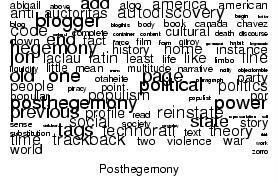But in the first instance, what he has to say is (as yet) nothing particularly specific. Indeed, generally, Gilroy seems to have reached that stage of his career at which he can dispense with references.
Sometimes that's OK. When he says that "problems like the disappearance of public torture are often understood to identify a significant stage in the development of a new type of power: capillary, biopolitical" (44), I know he's talking about Foucault, even if he doesn't say so. (My graduate students would be less happy, but there we go.)
But at other times, he succumbs to the temptation of broad sweeps in a way that makes me raise my eyebrows. For instance, he consistently asserts that his project is unfashionable and against the grain of scholarly and public discourse alike, but is it really true that "the academic tribunes of globalization do not usually include the end of formal empires or the wars of decolonization in their accounts of our planet's commercial and political integration" (55)? If so, which ones? And though it might be true that "some beguiling political models assume metropolitan governance to be innocent and colonial administration to be benign" (18), it would help to know which, and to be told who exactly is beguiled. There are times when it is as though Gilroy thinks that Niall Ferguson has a monopoly on scholarship or writing about imperialism.
And as for public discourse, I'm not completely convinced either that "dissidence has been criminalized" within our contemporary "states of permanent emergency" or even that such states would have it that "civilizations are now closed or finished cultures that need to be preserved. The individual agents who are their bearers and affiliates come ready-stamped with iconic badges of relative rank" (58). Look at the London bombings: apparently carried out by three people of Pakistani descent, one of whose parents rang the police and so opened up their investigation, but also a West Indian married to a white woman and now a series of East Africans, also apparently shopped by members of the Somali community. The ways in which they have been described and discussed (OK, apart from in the Express) reveal both a more complex public struggle to understand the relations between cultures and also the fact that there's no necessary link between bearers and badges.
Second, however, though Gilroy may not refer (yet) to specific instances of unruliness, the metaphors of disorder permeate the text. Despite his declarations of willful unfashionability, there's something very familiar about the way in which he opposes a "docile cultural history" with its "tidy models of governance" and its "polite scholastic debates" on the one hand with the "disreputable, angry places where the political interests of racialized minorities might be identified" (17) or with the "tangled, profane, and sometimes inconvenient forms of independency" that he wants to champion. "Scurrilous speculations" are to displace "polite labor" (53). Gilroy consistently invokes a rhetoric of messiness, of the "unkempt, unruly, and unplanned" (xiv), the "messy complexity of social life" (6), allied with "disreputable abolitionism," "insurrectionary practice," and "vitality" that "can still embarrass and contest the overly innocent versions of liberal thinking that are still in circulation" (57). Arranged against this vital, uncontainable disorder are "facile notions," "casual talk" (36), "squeamish reluctance" (54), and above all "cheap antihumanist positions" (7), "the cheapest invocations of incommensurable otherness" (8), and "cheap patriotism" (25).
Now, there are plenty of reasons to favour a bit of messiness and a bit of unruliness over over-tidy authoritarianism, the deceits of ideological whitewash, or (of course) the political hygiene of ethnic cleansing.
But I do wonder about the extent to which Gilroy's is also an aestheticized politics, if more Jackson Pollock than Albert Speer. And how much that has to do with the denigration of the "cheap." Why in politics as in housing should the expensive be valorized over the affordable? Moreover, does this opposition between tidiness and mess not also map onto a distinction between state and market?
Indeed, and rather against what is elsewhere an (Agamben-influenced) analysis of states of emergency, new modes of sovereignty, and the like, Gilroy at times implies that the market is itself undoing a couple of centuries of racism rooted in colonial order:
The colonial hierarchy that previously specified the proper relation of blackness to whiteness starts to break down. It yields to a different--usually commercial and resolutely antipolitical--understanding of what "races" are and how they differ from themselves and each other. The previously separated worlds of absolutely different groups can then be made to leak. They bleed risk, pleasure, and excitement into one another as part of selling things and accumulating capital. The magic of freshly racialized markets means that it is important to consider whether blackness and whiteness, like raciality's other inventions, should now be understood as nothing but transient symptoms of a dominant but dying order. (55)We can see that the messiness, entanglement, and unruliness everywhere privileged in this text maps quite closely onto market processes described in terms of "leak[age]," "bleed[ing]," "risk, pleasure, and excitement."
And there's nothing wrong, either (and especially for Deleuzians), with considering the revolutionary potential of capital's deterritorializing flows (as it were). But I wonder how that fits with what is otherwise Gilroy's high-minded defence of (a revitalized) modernity, universalism, humanism, and the like.

 Get the
Get the